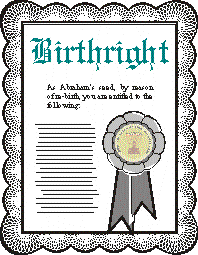The Lord warned Nephi to take whomever would follow him and depart into the wilderness, for his eldest brothers would seek to take his life. He did so, along with Sam and Zoram and any others of Lehi's progeny who would join them. They left the place of first landing and climbed into the mountains beyond. When they felt it was a safe distance, they stopped and build a city, which they called the City of Nephi. They built a homes and a temple, and surrounded the city with walls to keep their angry brothers at bay.
I was watching the history program, American Ride on BYUtv yesterday. For the past few weeks, the host, Stan Ellsworth, has been discussing the American Civil War of 1861-66. In yesterday's segment, he talked about how the South didn't refer to it as a civil war: rather, to the south, it was a war between the states. Ellsworth the defined the two terms.
A civil war is when a group of people are warring for control of the same government. The south didn't want to control the same government. They were fighting for the right to create their own, separate government. In that sense, the south was right: what happened in the 1860s was not a civil war, but a war between the states. The north saw it as a civil war because they believed that was an attempt to keep the south from leaving the union. Because they saw the war differently, they were both correct, from their own perspective, about the nature of the war. If you travel in many areas of the south even today, you will hear southerners calling it the War Between the States and rarely, if ever, referring to it as a civil war.
Point of view changes everything. What was the point of view of Laman, Lemuel, and Ishmael's sons?
- The birthright belonged to Laman not Nephi
- Lehi had stolen their home and property by forcing them to leave Jerusalem
- Nephi stole the plates, the Liahona, and the sword of Laban, which should have been theirs.
- Lehi had never been a prophet; Nephi wasn't a prophet; the people of Judah had been living the Law of Moses and were a righteous people and, therefore by extrapolation, Laman and Lemuel were a good people who didn't deserve all the hardships they had borne
- It was all Nephi's fault.
What was the point of view of Nephi and his followers?
- Lehi was a prophet; so was Nephi
- Jerusalem had been destroyed because the Jews had not been righteous
- The birthright belonged to Nephi because it had been bestowed upon him by his father was the patriarch and prophet
- Nephi was the only one who understood the will of the Lord and, therefore, the only one who could lead the people in paths of righteousness
- It was expedient that Nephi's group should have the brass plates because they were the only ones actively studying them and trying to live by the law.
Both sides thought they were right, just as in the American Civil War of the 19th Century. Both conflicts pitted friend against friend and brother against brother. It was not a racial thing: it was family thing. By the end of 1,000 years of history in the new land, the titles Nephite and Lamanite didn't refer to literal genetic descendants, but to those who lived the gospel and those who didn't, regardless of their parentage. By the time of the final war, neither side was on the right and the number of Nephites living the gospel could be counted on one's fingers.
Do points of view divide us as a nation? They certainly do! They have divided us almost to the brink of a 21st century civil war. The recent impeachment vote in the Senate was divided strictly along political party lines. Only one member of the President's own party voted to convict on one of the two counts. The fact that this man is a member of the Church of Jesus Christ of Latter-day Saints has really muddied the waters for many conservative Latter-day Saints.
We need to understand our own point of view, because everything in this life will be seen through its lenses. What is your point of view? Upon what evidence or inspiration is it based? Have you taken it to the Lord? I can strengthen my testimony in all things through relying on the Holy Ghost. Moroni promised that the Holy Ghost would testify of the truthfulness of the Book of Mormon. He went so far as to say by the power of the Holy Ghost, you may know the truth of all things. (Moroni 10:5)- even political things. What a blessing it is to me to have the companionship of this mighty Spirit of truth.
© February 2020 Dr. Kathleen Rawlings
Buntin Danielson






No comments:
Post a Comment